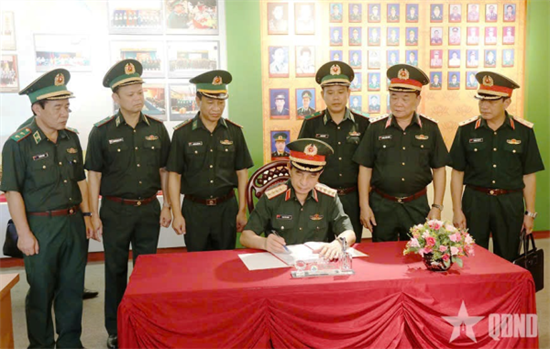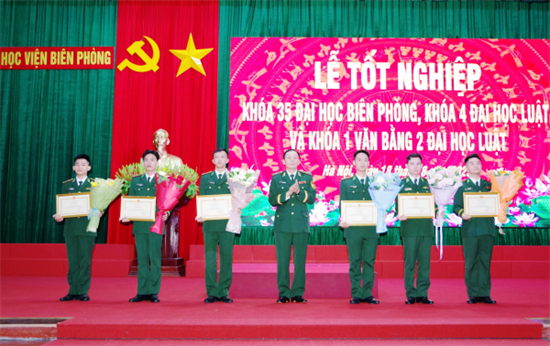Building smart, modern schools represents an important task and inevitable requirement amid the robust development of the 4th industrial revolution. Hence, the Border Guard Academy’s Party Committee and Board of Directors have been exercising their leadership and direction over a comprehensive reform in education, training, and science research towards smartness and modernity to meet their task requirements and raise the quality of human resources for the Military.
The Border Guard Academy is a top education and research centre of the Military and the country in the field of border defence. Currently, it is responsible for various forms of training, such as border guard officer training at bachelor’s, master’s, and doctoral degrees, border guard cadre training according to commanding positions, legal and judicial officer training, specialised training in border guard operations (reconnaissance, drug and crime prevention, border gate management, and border post command) for cadres, as well as bachelor’s and master’s programs for officers of the Lao People’s Army and the Royal Cambodian Armed Forces.
 |
| Gen. Phan Van Giang during his visit to the Academy (photo: qdnd.vn) |
Over the years, grasping higher echelons’ resolutions, directives, plans, and guidance on education, training, and science research, especially on building smart military schools, the Academy has taken synchronised measures to gradually realise the goal and criteria of a smart, modern school, achieving significant results. Notably, the information technology (IT) proficiency of its cadres and teachers has been improved; its training content, programs, and procedures have been supplemented, adjusted, standardised, and modernised; its education and training methods have been renewed in line with modern education trends. Its infrastructures, especially IT, have been improved. IT, simulation technology, and digital transformation have been applied in its teaching command, administration, and management. Digital transformation and “Digital Literacy” Movement have been promoted, thus leading to significant progress in education, training, science research, and other operations of the Academy.
However, building a smart, modern school is a new undertaking with demanding objectives, while the Academy’s resources remain limited. As a result, the implementation process faces difficulties, particularly in terms of digital equipment and infrastructure. Against that backdrop, to make use of opportunities and achievements created by the 4th industrial revolution, and realise the goal of building a smart, modern school, the Academy’s Party Committee and Board of Directors will continue adopting various measures, with a focus on the following.
Enhancing all-level party committees and commands’ leadership and direction over the building of a smart, modern school. The Academy will continue grasping higher echelons’ resolutions, directives, plans, and guidance on education, training, science research, digital transformation, and the building of smart, modern schools, particularly the 13th Politburo’s Resolution 71-NQ/TW, dated 22 August 2025, on breakthroughs in education and training development, the Central Military Commission’s Resolution 3488-NQ/QUTW, dated 29 January 2025, on breakthroughs in science - technology development, innovation, and digital transformation in the Military, Decision 1960/QĐ-TM, dated 1 August 2025, by Chief of the General Staff on promulgating the criteria framework for smart military schools, and Resolution 776-NQ/ĐU, dated 24 March 2023, by the Border Guard Force (BGF) Command’s Party Committee on renewing education and training to meet the requirements of BGF building in the new situation. All-level party committees and commands will concretise those documents into resolutions and action plans appropriate to their characteristics, functions, and tasks. The responsibility of heads of offices and units will be closely linked to the process of leadership, direction, and execution; efforts will be intensified to make breakthroughs in science - technology development, innovation, and digital transformation.
Furthermore, due attention will be paid to propagation and education work to render cadres, teachers, cadets, and soldiers fully aware of the role, necessity, and urgency of building a smart, modern school, thereby raising their responsibility in the process. Propagation and education work will be carried out flexibly, creatively via various forms and methods; great value will be attached to promoting the role of internal networks, reporters, and rapporteurs. Notably, the targets and content of building a smart, modern Academy will be closely associated with the 13th Politburo’s Conclusion 01-KL/TW, dated 18 May 2021, on continuing to implement the 12th Politburo’s Directive 05-CT/TW, dated 15 May 2016, on promoting the study and following of Ho Chi Minh’s ideology, ethics, and style, Resolution 847-NQ/QUTW, dated 28 December 2021, by the Central Military Commission on promoting the virtues of “Uncle Ho’s Soldiers” and resolutely combating individualism in the new situation, as well as the “Determined to Win” Emulation Movement and other campaigns. The Academy will focus on building and multiplying good examples in technology development, actively combating fearfulness of difficulties or hardships, achieving unity in terms of awareness and action for the successful fulfilment of this important task.
 |
| BGF Command gives certificates of merit to graduates with distinction in 2025 |
Building a pool of cadres and teachers to meet their task requirements. Cadres and teachers play a decisive role in the quality of the Academy’s education, training, and task performance. They are the core force in the building of a smart, modern school. Therefore, the Academy will continue executing the Project on “building a contingent of teachers and education managers in the Military for the period of 2023 - 2030 and beyond” as the basis for developing a corps of cadres and teachers both qualitatively and quantitatively. It will enhance the quality and effectiveness of professional training and development for teachers and education managers, emphasising basic, full-time, positions-based, and postgraduate training as the key to developing its personnel. It will combine domestic and overseas training, integrate external training at educational institutions with self-training, and encourage self-study, and professional improvement among its staff members.
In addition, great value will be attached to training and fostering a contingent of top and specialised scientists, making plans to enable experienced teachers to obtain doctorate and necessary qualifications for academic titles, such as professor, associate professor, excellent teacher, meritorious teacher, and people’s teacher. The Academy will develop and refine mechanisms and policies to motivate teachers and education managers to overcome difficulties and successfully fulfil their assigned tasks. It will increase refresher training courses to improve the capability of applying modern science, technology, and management methods in teaching. It will also improve its staff members’ IT, foreign language, and digital transformation competence and skills to exploit digital data for management, direction, administration, teaching, and science research, as well as their ability to work effectively in an international environment.
Renewing training programs, content, and methods in a modern way. Under the mottos set for education and training, namely “basic, systematic, unified, specialised” and “the quality of schools’ training is the combat readiness capacity of units”, the Academy will continue reviewing its existing training programs, eliminating irrelevant or outdated components, supplementing new issues relating to the management and protection of national territorial sovereignty and border security, crime prevention and control, military art, new weapons, realities of training and combat readiness, and experiences in responding to non-traditional security challenges drawn by military and border guard units. Its training programs will be adjusted to reduce general education subjects, increase specialised knowledge, shorten classroom time, and expand practice, self-study, and research periods. It will ensure a close combination between creative thinking and professional skill development with the improvement of political qualities, ethics, and lifestyle.
In addition to a reform in curriculum, the Academy will renew teaching and learning methods to promote learners’ dynamism and creativity, turn the training process into a process of self-training, and shift from knowledge acquisition to the development of learners’ competencies in line with its training goals and requirements. It will accelerate digital transformation and application of science and technology in teaching, learning, testing, and quality evaluation in education and training, aiming to develop a pool of “both red and expert” border guard officers capable of meeting the requirements of managing and defending territorial sovereignty and border security in the new situation.
Concentrating all resources on developing synchronised, modern infrastructures. Amid the new task requirements of education and training, continued investment in facilities and the building of a smart, modern Academy is crucial. In the immediate term, the Academy will promptly carry out the second phase of the project on training ground construction and upgrade its Data Centre and Border Guard Tactical - Technical Simulation Centre. In the long term, it will continue mobilising and efficiently utilising all available resources, ensuring focalised investments for sustainable development in line with the goals and requirements of education, training, science research, and the criteria of a smart, modern school. Priority will be given to investing in core components, such as modern, high-bandwidth IT infrastructures, advanced, synchronised equipment and software for information security. Additionally, the Academy will invest in education management and administration systems, lecture halls, specialised classrooms, training grounds, digital libraries, and smart, modern automated control and management systems so as to step by step realise the goal of building a smart, modern school and contribute to raising the quality of education, training, and science research, meeting its task requirements in the new situation.
Maj. Gen. GIANG VAN CU, PhD
Commandant of the Academy